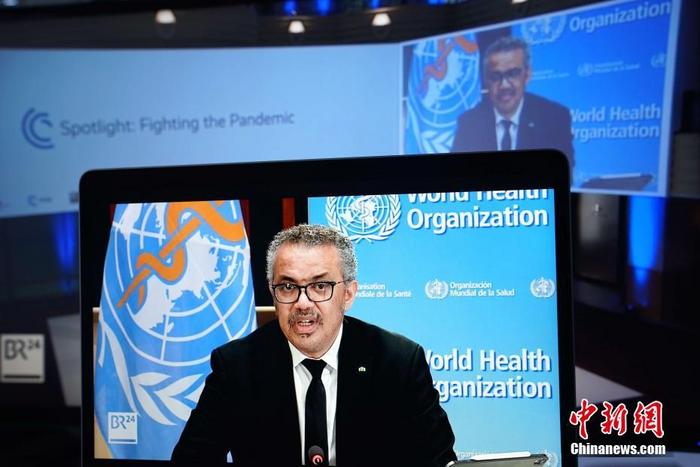China News Service, December 9th. According to the United Nations website, World Health Organization Director-General Tedros Adhanom Ghebreyesus said at a press conference held in Geneva on the 8th that 57 countries have reported the discovery of Omi Keron mutants, and this number is expected. Will continue to grow.
He said that governments should re-evaluate and revise their national plans based on the current situation and national capabilities.
Tan Desai said that certain characteristics of Omi Keron, including its global spread and a large number of mutations, indicate that it may have a significant impact on the course of the epidemic.
However, its exact impact is still unknown.
Data map: WHO Director-General Tan Desai attended the meeting via video connection.
Photo by China News Agency reporter Peng Dawei
The spread of Ome Keron
Tan Desai pointed out that in South Africa, the number of Omi Keron cases is rapidly increasing.
However, this variant was detected when the spread of the delta variant was very low, so it is not possible to compare the two.
Therefore, it is very important to carefully monitor the spreading situation around the world to understand whether the spread of the Omi Keron variant is greater than that of the Delta variant.
To this end, WHO calls on all countries to strengthen monitoring, testing and sequencing.
Tan Desai said that the new data from South Africa shows that the risk of re-infection caused by the Omi Keron variant is increased, but more data is needed to draw a more positive conclusion.
He pointed out that there is also some evidence that the disease caused by the Omi Keron variant is less severe than that of the Delta variant, but again, it is too early to make a conclusion.
Tan Desai said that new data are appearing every day, but scientists need time to complete the research and interpret the results.
Before gaining a more complete understanding, people must be careful not to jump to conclusions.
He said that WHO convenes thousands of experts from all over the world every day to share and analyze data to promote research forward.
He emphasized that although answers still need to be found on some key questions, people are not helpless with Omi Keron or Delta variants.
He pointed out that the measures taken by countries today and in the coming days and weeks will determine how the Omi Keron variant evolves and spreads.
Feasible countermeasures
Tan Desai encourages all countries to speed up the vaccination of high-risk groups; increase efforts to reduce the spread of the virus through a combination of public health measures that suit their own reality; expand surveillance, testing and sequencing, and share samples with the international community; through maintaining with others Reduce risks by keeping safe distances, avoiding crowds, wearing masks, cleaning hands, and staying outdoors or indoors in a well-ventilated space as much as possible to meet.
Tedros once again called for avoiding invalid and discriminatory travel bans.
He was pleased that France and Switzerland lifted the travel ban on southern African countries and urged other countries to follow suit.
Tan Desai finally emphasized that the new crown virus is constantly changing, but the collective determination expressed by the world cannot be changed.
Cases surge in the Americas
Etienne, director of the World Health Organization’s Regional Office for the Americas, "Pan American Health Organization", informed at a press conference held in Washington, the capital of the United States, where its headquarters is located on the 8th, that in the past week, the Americas reported more than 782655 new cases of new crown infection and 10950 related deaths. example.
In North America, cases in parts of Canada and Mexico are still increasing.
In the Caribbean, Trinidad and Tobago's new crown infection cases, hospitalizations and deaths continue to surge.
In South America, COVID-19 cases in Bolivia, Peru, and Colombia continue to increase steadily.
Etienne said that several countries including Argentina, Brazil, Canada, Chile, Mexico and the United States have reported the discovery of Omi Keron mutants.
She pointed out that it is only a matter of time before this variant spreads to more countries.
Etienne said that so far, 55% of people in Latin America and the Caribbean have been fully vaccinated against the new crown vaccine.
She pointed out that 20 countries in the Americas have not yet reached the WHO target of achieving 40% vaccination coverage by the end of the year.
At the current rate, six countries may not be able to achieve this goal.

